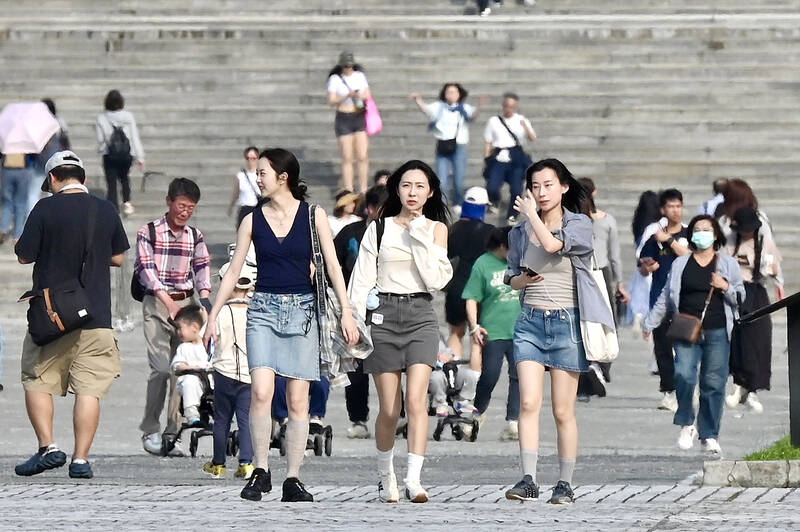Taiwan’s consumer confidence took another blow this month, sliding for the seventh straight month to its worst state in a year, as people grew increasingly uneasy about economic uncertainties linked to US tariffs, a survey by National Central University showed yesterday.
The consumer confidence index shed 3.65 points to 68.21, a 12-month low with all six sub-
indices on price perceptions, family finances, economic outlook, job opportunities, stock investment prospects, and interest of durable goods purchases weakening, according to the survey conducted by the university’s Center for Taiwan Economic Development.

Photo: George Tsorng, Taipei Times
Center head Dachrahn Wu (吳大任) blamed the confidence retreat on US President Donald Trump’s hostile trade policy and its potential impact on the global supply chain, corporate earnings and financial markets.
Confidence in stock investment posted the fastest decline, with the reading plummeting by 11.25 points to 38.64, while buying interest in durable goods fell 2.86 points to 99.13 and perception of economic prospects in the next six months slid 2.71 points to 84.09, it said.
A sub-index score of 0-100 indicates pessimism, while a score of 100-200 shows optimism.
“The stock market crashed early this month as Trump’s announcement on April 2 of ‘reciprocal’ tariffs on major trading partners rattled investor confidence,” Wu said, adding that the TAIEX plunged more than 2,000 points.
Adding to the gloom, the index for real-estate purchases fell to 96.85, shifting from an optimistic outlook to a pessimistic one to the poorest state since August 2020 when Taiwan was grappling with the COVID-19 pandemic.
The stock rout played havoc on home purchasing ability, especially for young first-home buyers, who rely on capital gains to support down payment and mortgage burdens, Wu said.
“There is a strong link between the stock market and the housing market in Taiwan,” he said. “When people see their investment portfolio shrinking, their ability to buy real-estate property drops significantly.”
The situation could deteriorate if Taiwan’s tariff negotiations with the US fall apart or were disastrous, resulting in factory furloughs and rising unemployment, Wu said.
Taiwan’s household finances could then face a much deeper and more prolonged damage, he said.
In related developments, the government’s business climate monitor last month signaled “yellow-red,” as exports remained robust, but uncertainties loom ahead, the National Development Council said in a report yesterday.
The council’s business climate gauge lost 3 points to 34, as front-loading demand bolstered overtime hours, but business sentiment and local share prices took a downturn.
The index of leading indicators, which seeks to capture the economic scene in the next six months, weakened 0.15 percent to 102.14, as readings on export orders, stock prices and business confidence showed negative cyclical movements.
However, the measure on semiconductor equipment and the labor accession rate picked up, the council said.
The index of coincident indicators, which reflects the current economic state, gained 0.93 percent to 106.32, thanks to favorable exports, industrial production and manufacturing sales, although the reading on electricity utilization weakened, it said.

NO BREAKTHROUGH? More substantial ‘deliverables,’ such as tariff reductions, would likely be saved for a meeting between Trump and Xi later this year, a trade expert said China launched two probes targeting the US semiconductor sector on Saturday ahead of talks between the two nations in Spain this week on trade, national security and the ownership of social media platform TikTok. China’s Ministry of Commerce announced an anti-dumping investigation into certain analog integrated circuits (ICs) imported from the US. The investigation is to target some commodity interface ICs and gate driver ICs, which are commonly made by US companies such as Texas Instruments Inc and ON Semiconductor Corp. The ministry also announced an anti-discrimination probe into US measures against China’s chip sector. US measures such as export curbs and tariffs

The US on Friday penalized two Chinese firms that acquired US chipmaking equipment for China’s top chipmaker, Semiconductor Manufacturing International Corp (SMIC, 中芯國際), including them among 32 entities that were added to the US Department of Commerce’s restricted trade list, a US government posting showed. Twenty-three of the 32 are in China. GMC Semiconductor Technology (Wuxi) Co (吉姆西半導體科技) and Jicun Semiconductor Technology (Shanghai) Co (吉存半導體科技) were placed on the list, formally known as the Entity List, for acquiring equipment for SMIC Northern Integrated Circuit Manufacturing (Beijing) Corp (中芯北方積體電路) and Semiconductor Manufacturing International (Beijing) Corp (中芯北京), the US Federal Register posting said. The

India’s ban of online money-based games could drive addicts to unregulated apps and offshore platforms that pose new financial and social risks, fantasy-sports gaming experts say. Indian Prime Minister Narendra Modi’s government banned real-money online games late last month, citing financial losses and addiction, leading to a shutdown of many apps offering paid fantasy cricket, rummy and poker games. “Many will move to offshore platforms, because of the addictive nature — they will find alternate means to get that dopamine hit,” said Viren Hemrajani, a Mumbai-based fantasy cricket analyst. “It [also] leads to fraud and scams, because everything is now

MORTGAGE WORRIES: About 34% of respondents to a survey said they would approach multiple lenders to pay for a home, while 29.2% said they would ask family for help New housing projects in Taiwan’s six special municipalities, as well as Hsinchu city and county, are projected to total NT$710.65 billion (US$23.61 billion) in the upcoming fall sales season, a record 30 percent decrease from a year earlier, as tighter mortgage rules prompt developers to pull back, property listing platform 591.com (591新建案) said yesterday. The number of projects has also fallen to 312, a more than 20 percent decrease year-on-year, underscoring weakening sentiment and momentum amid lingering policy and financing headwinds. New Taipei City and Taoyuan bucked the downturn in project value, while Taipei, Hsinchu city and county, Taichung, Tainan and Kaohsiung